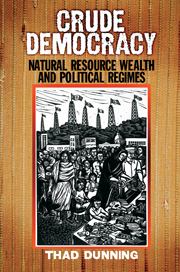Book contents
- Frontmatter
- Contents
- List of Figures
- List of Tables
- Preface and Acknowledgments
- Crude Democracy: Natural Resource Wealth and Political Regimes Cambridge
- 1 DOES OIL PROMOTE DEMOCRACY?
- 2 THE FOUNDATIONS OF RENTIER STATES
- 3 RESOURCE RENTS AND THE POLITICAL REGIME
- 4 STATISTICAL TESTS ON RENTS AND THE REGIME
- 5 THE DEMOCRATIC EFFECT OF RENTS
- 6 RENTIER DEMOCRACY IN COMPARATIVE PERSPECTIVE
- 7 THEORETICAL EXTENSIONS
- 8 CONCLUSION: WHITHER THE RESOURCE CURSE?
- Appendix: Construction of the Simulations
- Bibliography
- Index
5 - THE DEMOCRATIC EFFECT OF RENTS
Published online by Cambridge University Press: 17 July 2009
- Frontmatter
- Contents
- List of Figures
- List of Tables
- Preface and Acknowledgments
- Crude Democracy: Natural Resource Wealth and Political Regimes Cambridge
- 1 DOES OIL PROMOTE DEMOCRACY?
- 2 THE FOUNDATIONS OF RENTIER STATES
- 3 RESOURCE RENTS AND THE POLITICAL REGIME
- 4 STATISTICAL TESTS ON RENTS AND THE REGIME
- 5 THE DEMOCRATIC EFFECT OF RENTS
- 6 RENTIER DEMOCRACY IN COMPARATIVE PERSPECTIVE
- 7 THEORETICAL EXTENSIONS
- 8 CONCLUSION: WHITHER THE RESOURCE CURSE?
- Appendix: Construction of the Simulations
- Bibliography
- Index
Summary
In contrast to much recent work on the political effects of natural resource wealth, the argument developed in this study posits the existence of a democratic effect of resource rents. The theoretical approach developed in Chapter Three suggests conditions under which this democratic effect may become more important, relative to the authoritarian effects of resource wealth. The theory therefore generates hypotheses to help explain variation in political outcomes across resource-rich countries.
The statistical evidence presented in Chapter Four broadly supports these hypotheses. Consistent with previous quantitative work on the link between resource wealth and authoritarianism (Jensen and Wantchekon 2004; Ross 2001), my analysis of cross-section time-series data does not contradict the idea of an authoritarian effect of rents; indeed, at average values of conditioning variables in the data set, the net effect of oil rents is to promote authoritarianism. Yet, the evidence also suggests a conditionally positive effect of natural resources on democracy. Although natural resources may have an authoritarian effect, there is also evidence that natural resource wealth can instead promote democracy.
Nonetheless, other theories are conceivably consistent with the evidence presented thus far. As discussed in the previous chapter, the democratic effect of rents might work through other socioeconomic channels than those I emphasize (Herb 2005); various institutional variables might also provide the principal source of variation across resource-rich countries. It is therefore crucial to probe relatively fine-grained case-study evidence.
- Type
- Chapter
- Information
- Crude DemocracyNatural Resource Wealth and Political Regimes, pp. 148 - 209Publisher: Cambridge University PressPrint publication year: 2008



